Report on Interpersonal Communication Challenges at Wildwater Grill
VerifiedAdded on 2020/05/16
|11
|1773
|124
Report
AI Summary
This report investigates interpersonal communication challenges at Wildwater Grill, a restaurant at Dee Why Beach. The study is based on an interview with a senior manager to understand the types of communication used and the challenges faced. The findings reveal that the restaurant employs both verbal and non-verbal communication, with challenges arising from staff diversity and language barriers. The senior manager effectively utilizes interpersonal relationships to overcome these challenges, particularly through symbolic interaction. However, the report highlights that the aspect of staff-customer communication has not been effectively evaluated. The report concludes with recommendations for improving communication, such as English language training and maintaining consistent non-verbal communication methods.
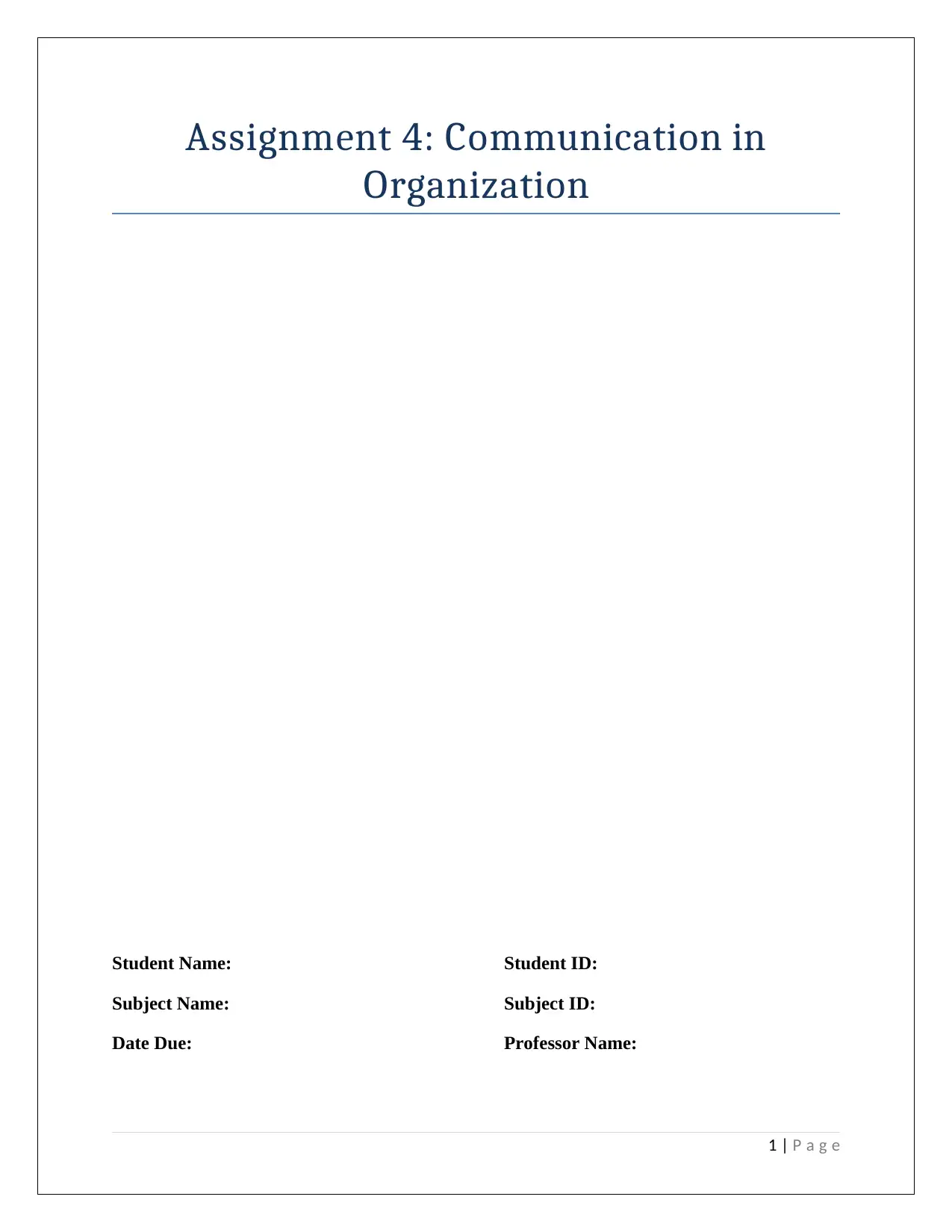
Assignment 4: Communication in
Organization
Student Name: Student ID:
Subject Name: Subject ID:
Date Due: Professor Name:
1 | P a g e
Organization
Student Name: Student ID:
Subject Name: Subject ID:
Date Due: Professor Name:
1 | P a g e
Paraphrase This Document
Need a fresh take? Get an instant paraphrase of this document with our AI Paraphraser
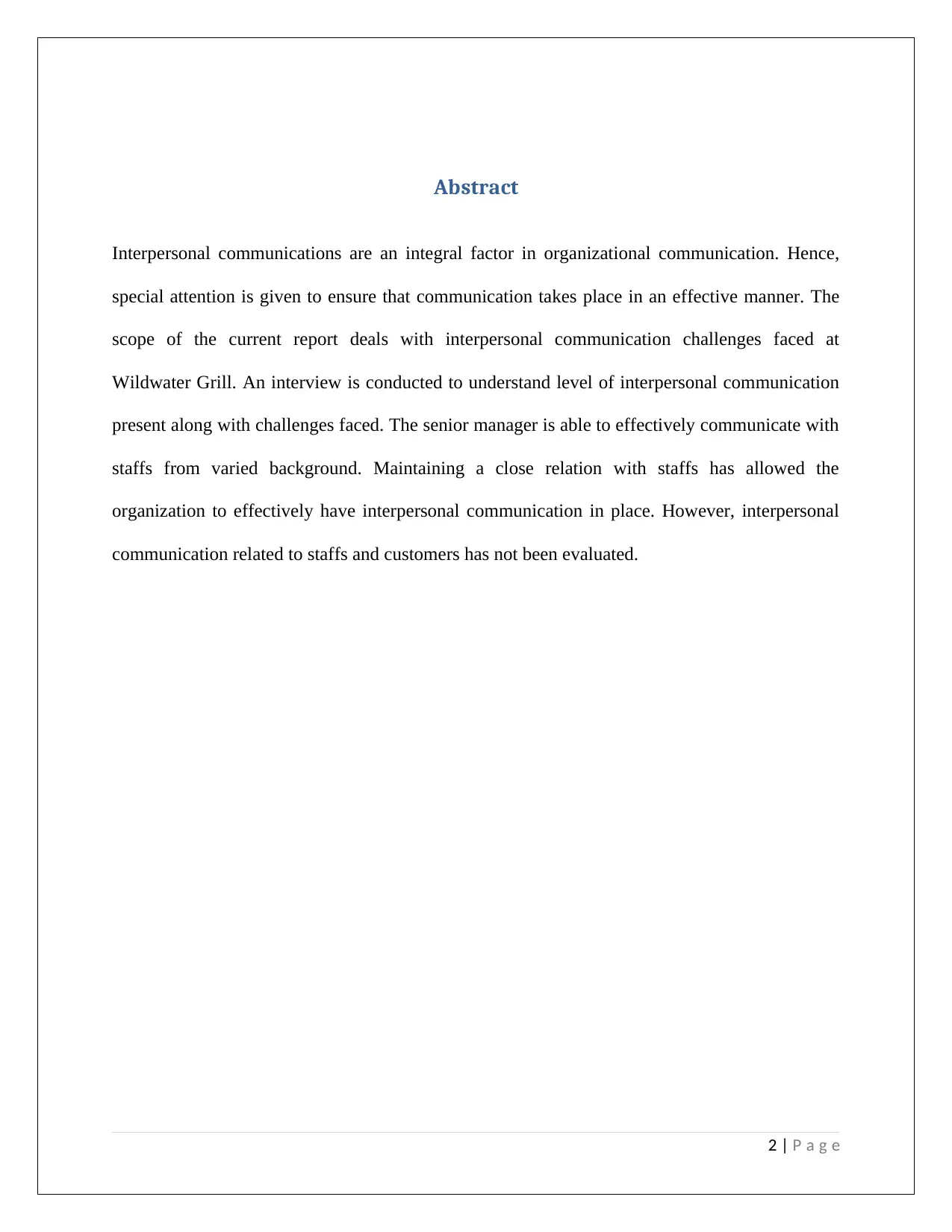
Abstract
Interpersonal communications are an integral factor in organizational communication. Hence,
special attention is given to ensure that communication takes place in an effective manner. The
scope of the current report deals with interpersonal communication challenges faced at
Wildwater Grill. An interview is conducted to understand level of interpersonal communication
present along with challenges faced. The senior manager is able to effectively communicate with
staffs from varied background. Maintaining a close relation with staffs has allowed the
organization to effectively have interpersonal communication in place. However, interpersonal
communication related to staffs and customers has not been evaluated.
2 | P a g e
Interpersonal communications are an integral factor in organizational communication. Hence,
special attention is given to ensure that communication takes place in an effective manner. The
scope of the current report deals with interpersonal communication challenges faced at
Wildwater Grill. An interview is conducted to understand level of interpersonal communication
present along with challenges faced. The senior manager is able to effectively communicate with
staffs from varied background. Maintaining a close relation with staffs has allowed the
organization to effectively have interpersonal communication in place. However, interpersonal
communication related to staffs and customers has not been evaluated.
2 | P a g e
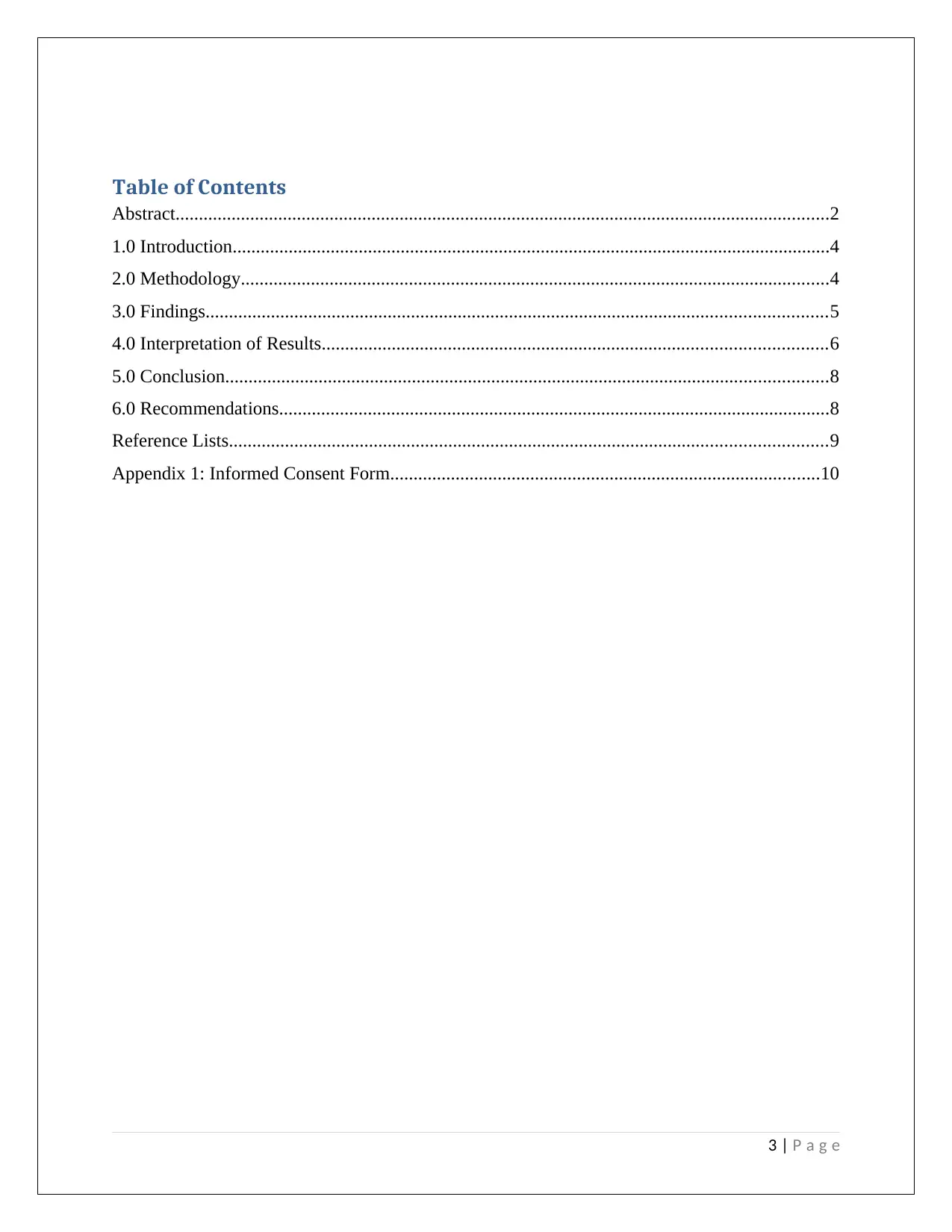
Table of Contents
Abstract............................................................................................................................................2
1.0 Introduction................................................................................................................................4
2.0 Methodology..............................................................................................................................4
3.0 Findings.....................................................................................................................................5
4.0 Interpretation of Results............................................................................................................6
5.0 Conclusion.................................................................................................................................8
6.0 Recommendations......................................................................................................................8
Reference Lists................................................................................................................................9
Appendix 1: Informed Consent Form............................................................................................10
3 | P a g e
Abstract............................................................................................................................................2
1.0 Introduction................................................................................................................................4
2.0 Methodology..............................................................................................................................4
3.0 Findings.....................................................................................................................................5
4.0 Interpretation of Results............................................................................................................6
5.0 Conclusion.................................................................................................................................8
6.0 Recommendations......................................................................................................................8
Reference Lists................................................................................................................................9
Appendix 1: Informed Consent Form............................................................................................10
3 | P a g e
⊘ This is a preview!⊘
Do you want full access?
Subscribe today to unlock all pages.

Trusted by 1+ million students worldwide
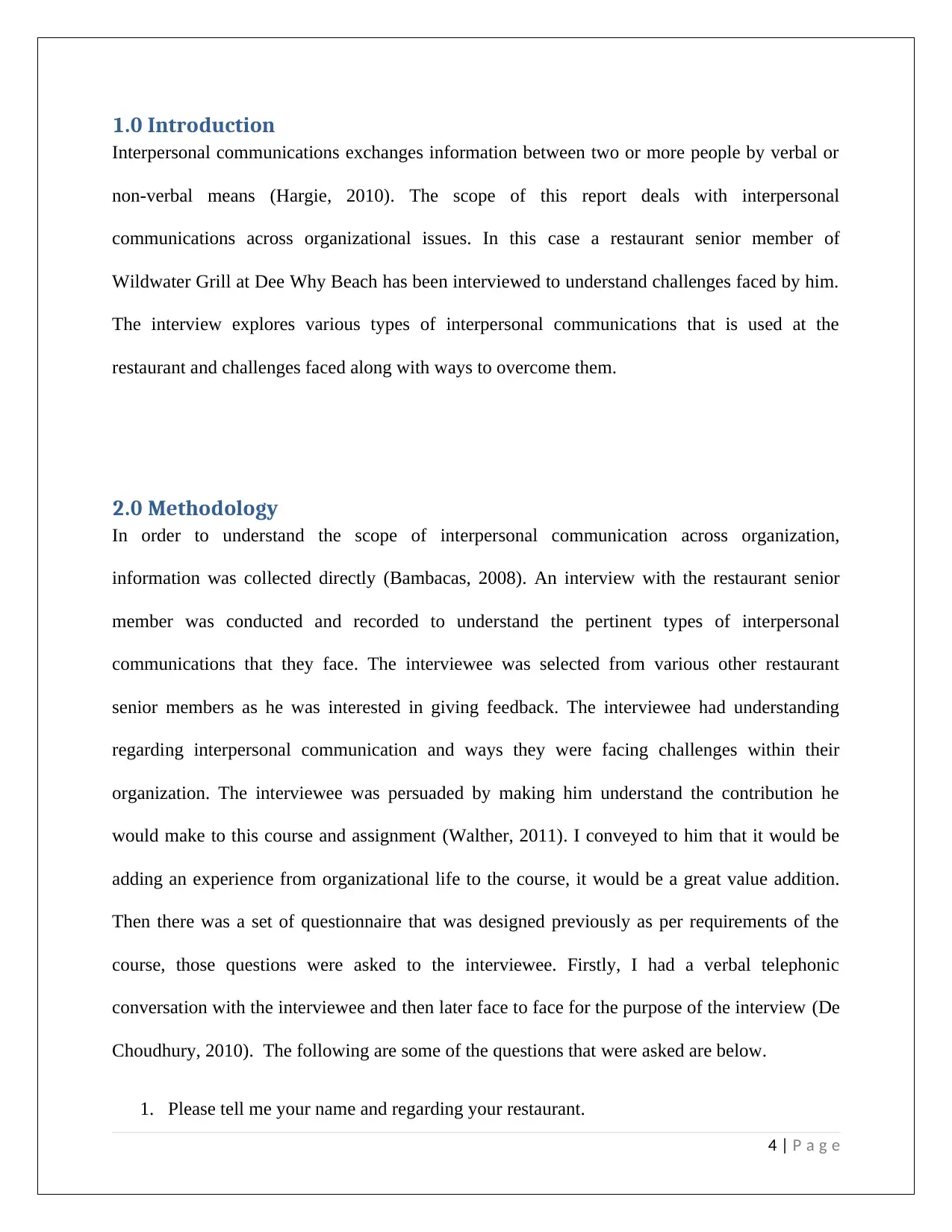
1.0 Introduction
Interpersonal communications exchanges information between two or more people by verbal or
non-verbal means (Hargie, 2010). The scope of this report deals with interpersonal
communications across organizational issues. In this case a restaurant senior member of
Wildwater Grill at Dee Why Beach has been interviewed to understand challenges faced by him.
The interview explores various types of interpersonal communications that is used at the
restaurant and challenges faced along with ways to overcome them.
2.0 Methodology
In order to understand the scope of interpersonal communication across organization,
information was collected directly (Bambacas, 2008). An interview with the restaurant senior
member was conducted and recorded to understand the pertinent types of interpersonal
communications that they face. The interviewee was selected from various other restaurant
senior members as he was interested in giving feedback. The interviewee had understanding
regarding interpersonal communication and ways they were facing challenges within their
organization. The interviewee was persuaded by making him understand the contribution he
would make to this course and assignment (Walther, 2011). I conveyed to him that it would be
adding an experience from organizational life to the course, it would be a great value addition.
Then there was a set of questionnaire that was designed previously as per requirements of the
course, those questions were asked to the interviewee. Firstly, I had a verbal telephonic
conversation with the interviewee and then later face to face for the purpose of the interview (De
Choudhury, 2010). The following are some of the questions that were asked are below.
1. Please tell me your name and regarding your restaurant.
4 | P a g e
Interpersonal communications exchanges information between two or more people by verbal or
non-verbal means (Hargie, 2010). The scope of this report deals with interpersonal
communications across organizational issues. In this case a restaurant senior member of
Wildwater Grill at Dee Why Beach has been interviewed to understand challenges faced by him.
The interview explores various types of interpersonal communications that is used at the
restaurant and challenges faced along with ways to overcome them.
2.0 Methodology
In order to understand the scope of interpersonal communication across organization,
information was collected directly (Bambacas, 2008). An interview with the restaurant senior
member was conducted and recorded to understand the pertinent types of interpersonal
communications that they face. The interviewee was selected from various other restaurant
senior members as he was interested in giving feedback. The interviewee had understanding
regarding interpersonal communication and ways they were facing challenges within their
organization. The interviewee was persuaded by making him understand the contribution he
would make to this course and assignment (Walther, 2011). I conveyed to him that it would be
adding an experience from organizational life to the course, it would be a great value addition.
Then there was a set of questionnaire that was designed previously as per requirements of the
course, those questions were asked to the interviewee. Firstly, I had a verbal telephonic
conversation with the interviewee and then later face to face for the purpose of the interview (De
Choudhury, 2010). The following are some of the questions that were asked are below.
1. Please tell me your name and regarding your restaurant.
4 | P a g e
Paraphrase This Document
Need a fresh take? Get an instant paraphrase of this document with our AI Paraphraser
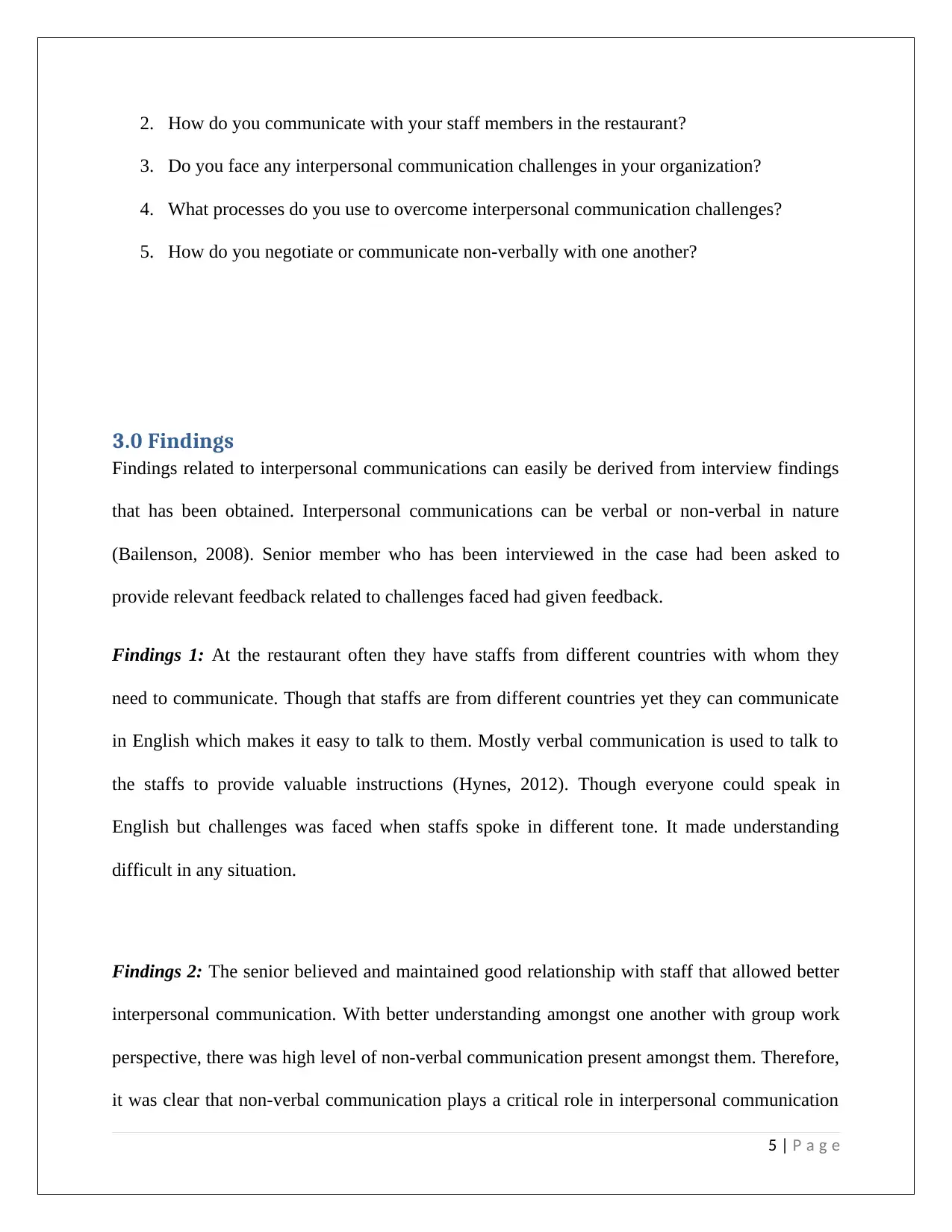
2. How do you communicate with your staff members in the restaurant?
3. Do you face any interpersonal communication challenges in your organization?
4. What processes do you use to overcome interpersonal communication challenges?
5. How do you negotiate or communicate non-verbally with one another?
3.0 Findings
Findings related to interpersonal communications can easily be derived from interview findings
that has been obtained. Interpersonal communications can be verbal or non-verbal in nature
(Bailenson, 2008). Senior member who has been interviewed in the case had been asked to
provide relevant feedback related to challenges faced had given feedback.
Findings 1: At the restaurant often they have staffs from different countries with whom they
need to communicate. Though that staffs are from different countries yet they can communicate
in English which makes it easy to talk to them. Mostly verbal communication is used to talk to
the staffs to provide valuable instructions (Hynes, 2012). Though everyone could speak in
English but challenges was faced when staffs spoke in different tone. It made understanding
difficult in any situation.
Findings 2: The senior believed and maintained good relationship with staff that allowed better
interpersonal communication. With better understanding amongst one another with group work
perspective, there was high level of non-verbal communication present amongst them. Therefore,
it was clear that non-verbal communication plays a critical role in interpersonal communication
5 | P a g e
3. Do you face any interpersonal communication challenges in your organization?
4. What processes do you use to overcome interpersonal communication challenges?
5. How do you negotiate or communicate non-verbally with one another?
3.0 Findings
Findings related to interpersonal communications can easily be derived from interview findings
that has been obtained. Interpersonal communications can be verbal or non-verbal in nature
(Bailenson, 2008). Senior member who has been interviewed in the case had been asked to
provide relevant feedback related to challenges faced had given feedback.
Findings 1: At the restaurant often they have staffs from different countries with whom they
need to communicate. Though that staffs are from different countries yet they can communicate
in English which makes it easy to talk to them. Mostly verbal communication is used to talk to
the staffs to provide valuable instructions (Hynes, 2012). Though everyone could speak in
English but challenges was faced when staffs spoke in different tone. It made understanding
difficult in any situation.
Findings 2: The senior believed and maintained good relationship with staff that allowed better
interpersonal communication. With better understanding amongst one another with group work
perspective, there was high level of non-verbal communication present amongst them. Therefore,
it was clear that non-verbal communication plays a critical role in interpersonal communication
5 | P a g e
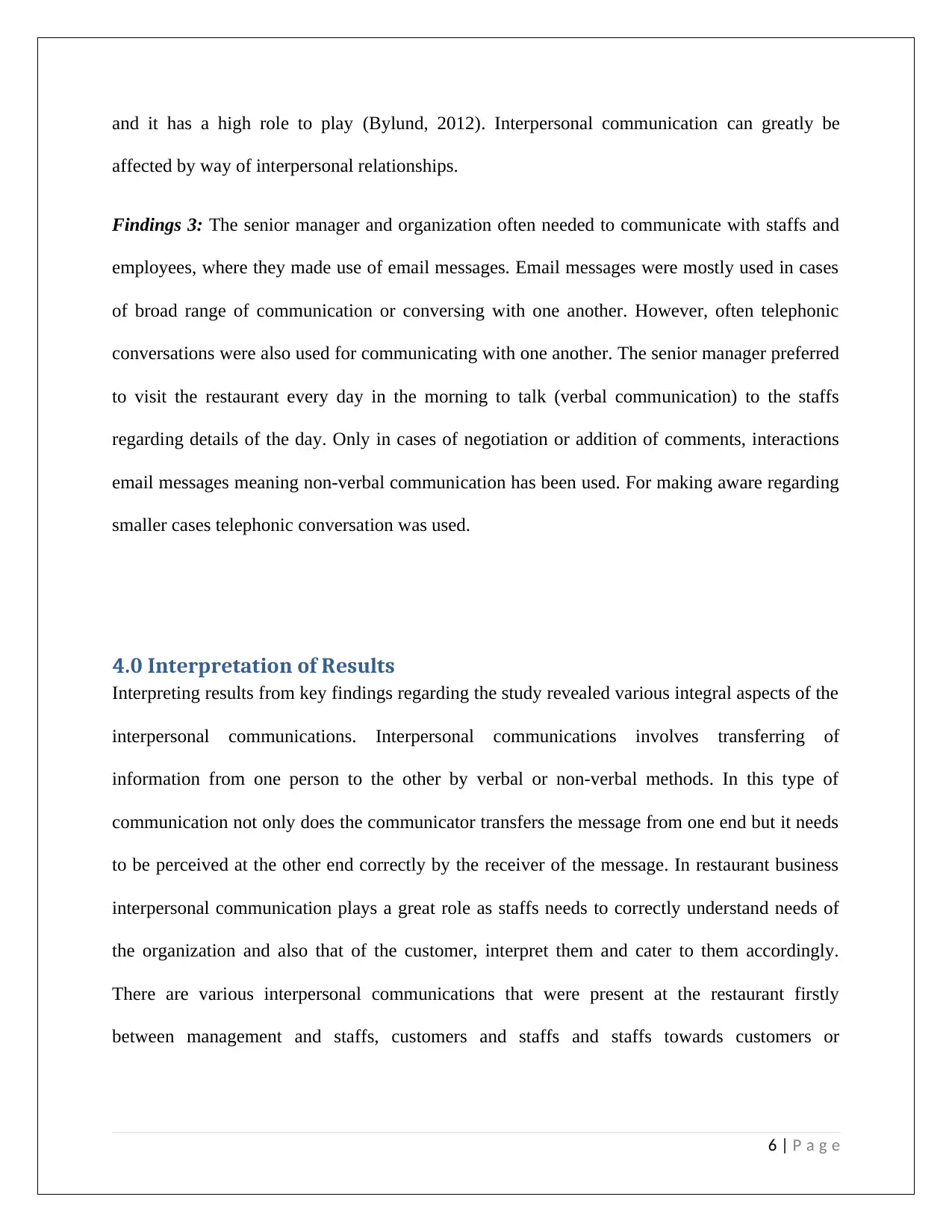
and it has a high role to play (Bylund, 2012). Interpersonal communication can greatly be
affected by way of interpersonal relationships.
Findings 3: The senior manager and organization often needed to communicate with staffs and
employees, where they made use of email messages. Email messages were mostly used in cases
of broad range of communication or conversing with one another. However, often telephonic
conversations were also used for communicating with one another. The senior manager preferred
to visit the restaurant every day in the morning to talk (verbal communication) to the staffs
regarding details of the day. Only in cases of negotiation or addition of comments, interactions
email messages meaning non-verbal communication has been used. For making aware regarding
smaller cases telephonic conversation was used.
4.0 Interpretation of Results
Interpreting results from key findings regarding the study revealed various integral aspects of the
interpersonal communications. Interpersonal communications involves transferring of
information from one person to the other by verbal or non-verbal methods. In this type of
communication not only does the communicator transfers the message from one end but it needs
to be perceived at the other end correctly by the receiver of the message. In restaurant business
interpersonal communication plays a great role as staffs needs to correctly understand needs of
the organization and also that of the customer, interpret them and cater to them accordingly.
There are various interpersonal communications that were present at the restaurant firstly
between management and staffs, customers and staffs and staffs towards customers or
6 | P a g e
affected by way of interpersonal relationships.
Findings 3: The senior manager and organization often needed to communicate with staffs and
employees, where they made use of email messages. Email messages were mostly used in cases
of broad range of communication or conversing with one another. However, often telephonic
conversations were also used for communicating with one another. The senior manager preferred
to visit the restaurant every day in the morning to talk (verbal communication) to the staffs
regarding details of the day. Only in cases of negotiation or addition of comments, interactions
email messages meaning non-verbal communication has been used. For making aware regarding
smaller cases telephonic conversation was used.
4.0 Interpretation of Results
Interpreting results from key findings regarding the study revealed various integral aspects of the
interpersonal communications. Interpersonal communications involves transferring of
information from one person to the other by verbal or non-verbal methods. In this type of
communication not only does the communicator transfers the message from one end but it needs
to be perceived at the other end correctly by the receiver of the message. In restaurant business
interpersonal communication plays a great role as staffs needs to correctly understand needs of
the organization and also that of the customer, interpret them and cater to them accordingly.
There are various interpersonal communications that were present at the restaurant firstly
between management and staffs, customers and staffs and staffs towards customers or
6 | P a g e
⊘ This is a preview!⊘
Do you want full access?
Subscribe today to unlock all pages.

Trusted by 1+ million students worldwide
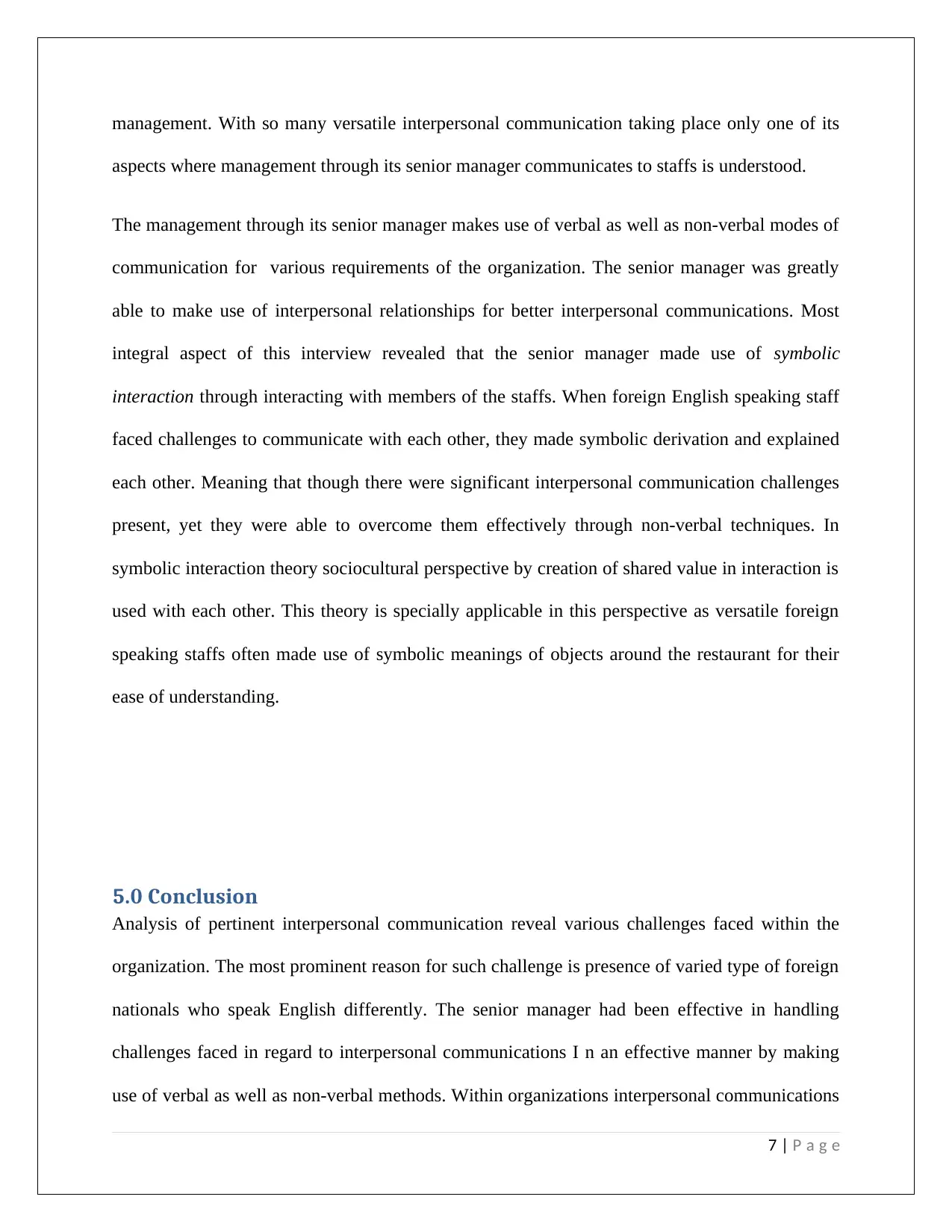
management. With so many versatile interpersonal communication taking place only one of its
aspects where management through its senior manager communicates to staffs is understood.
The management through its senior manager makes use of verbal as well as non-verbal modes of
communication for various requirements of the organization. The senior manager was greatly
able to make use of interpersonal relationships for better interpersonal communications. Most
integral aspect of this interview revealed that the senior manager made use of symbolic
interaction through interacting with members of the staffs. When foreign English speaking staff
faced challenges to communicate with each other, they made symbolic derivation and explained
each other. Meaning that though there were significant interpersonal communication challenges
present, yet they were able to overcome them effectively through non-verbal techniques. In
symbolic interaction theory sociocultural perspective by creation of shared value in interaction is
used with each other. This theory is specially applicable in this perspective as versatile foreign
speaking staffs often made use of symbolic meanings of objects around the restaurant for their
ease of understanding.
5.0 Conclusion
Analysis of pertinent interpersonal communication reveal various challenges faced within the
organization. The most prominent reason for such challenge is presence of varied type of foreign
nationals who speak English differently. The senior manager had been effective in handling
challenges faced in regard to interpersonal communications I n an effective manner by making
use of verbal as well as non-verbal methods. Within organizations interpersonal communications
7 | P a g e
aspects where management through its senior manager communicates to staffs is understood.
The management through its senior manager makes use of verbal as well as non-verbal modes of
communication for various requirements of the organization. The senior manager was greatly
able to make use of interpersonal relationships for better interpersonal communications. Most
integral aspect of this interview revealed that the senior manager made use of symbolic
interaction through interacting with members of the staffs. When foreign English speaking staff
faced challenges to communicate with each other, they made symbolic derivation and explained
each other. Meaning that though there were significant interpersonal communication challenges
present, yet they were able to overcome them effectively through non-verbal techniques. In
symbolic interaction theory sociocultural perspective by creation of shared value in interaction is
used with each other. This theory is specially applicable in this perspective as versatile foreign
speaking staffs often made use of symbolic meanings of objects around the restaurant for their
ease of understanding.
5.0 Conclusion
Analysis of pertinent interpersonal communication reveal various challenges faced within the
organization. The most prominent reason for such challenge is presence of varied type of foreign
nationals who speak English differently. The senior manager had been effective in handling
challenges faced in regard to interpersonal communications I n an effective manner by making
use of verbal as well as non-verbal methods. Within organizations interpersonal communications
7 | P a g e
Paraphrase This Document
Need a fresh take? Get an instant paraphrase of this document with our AI Paraphraser
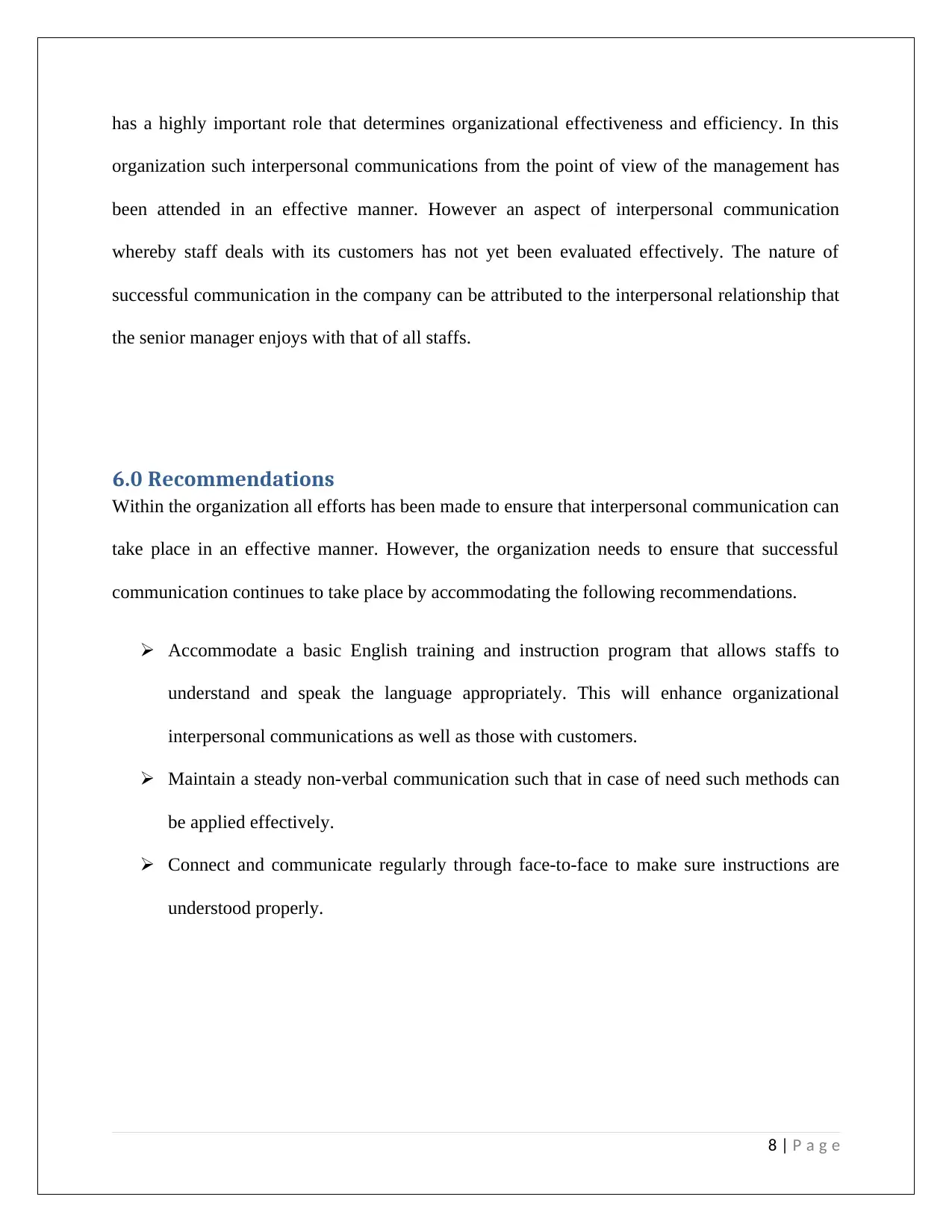
has a highly important role that determines organizational effectiveness and efficiency. In this
organization such interpersonal communications from the point of view of the management has
been attended in an effective manner. However an aspect of interpersonal communication
whereby staff deals with its customers has not yet been evaluated effectively. The nature of
successful communication in the company can be attributed to the interpersonal relationship that
the senior manager enjoys with that of all staffs.
6.0 Recommendations
Within the organization all efforts has been made to ensure that interpersonal communication can
take place in an effective manner. However, the organization needs to ensure that successful
communication continues to take place by accommodating the following recommendations.
Accommodate a basic English training and instruction program that allows staffs to
understand and speak the language appropriately. This will enhance organizational
interpersonal communications as well as those with customers.
Maintain a steady non-verbal communication such that in case of need such methods can
be applied effectively.
Connect and communicate regularly through face-to-face to make sure instructions are
understood properly.
8 | P a g e
organization such interpersonal communications from the point of view of the management has
been attended in an effective manner. However an aspect of interpersonal communication
whereby staff deals with its customers has not yet been evaluated effectively. The nature of
successful communication in the company can be attributed to the interpersonal relationship that
the senior manager enjoys with that of all staffs.
6.0 Recommendations
Within the organization all efforts has been made to ensure that interpersonal communication can
take place in an effective manner. However, the organization needs to ensure that successful
communication continues to take place by accommodating the following recommendations.
Accommodate a basic English training and instruction program that allows staffs to
understand and speak the language appropriately. This will enhance organizational
interpersonal communications as well as those with customers.
Maintain a steady non-verbal communication such that in case of need such methods can
be applied effectively.
Connect and communicate regularly through face-to-face to make sure instructions are
understood properly.
8 | P a g e
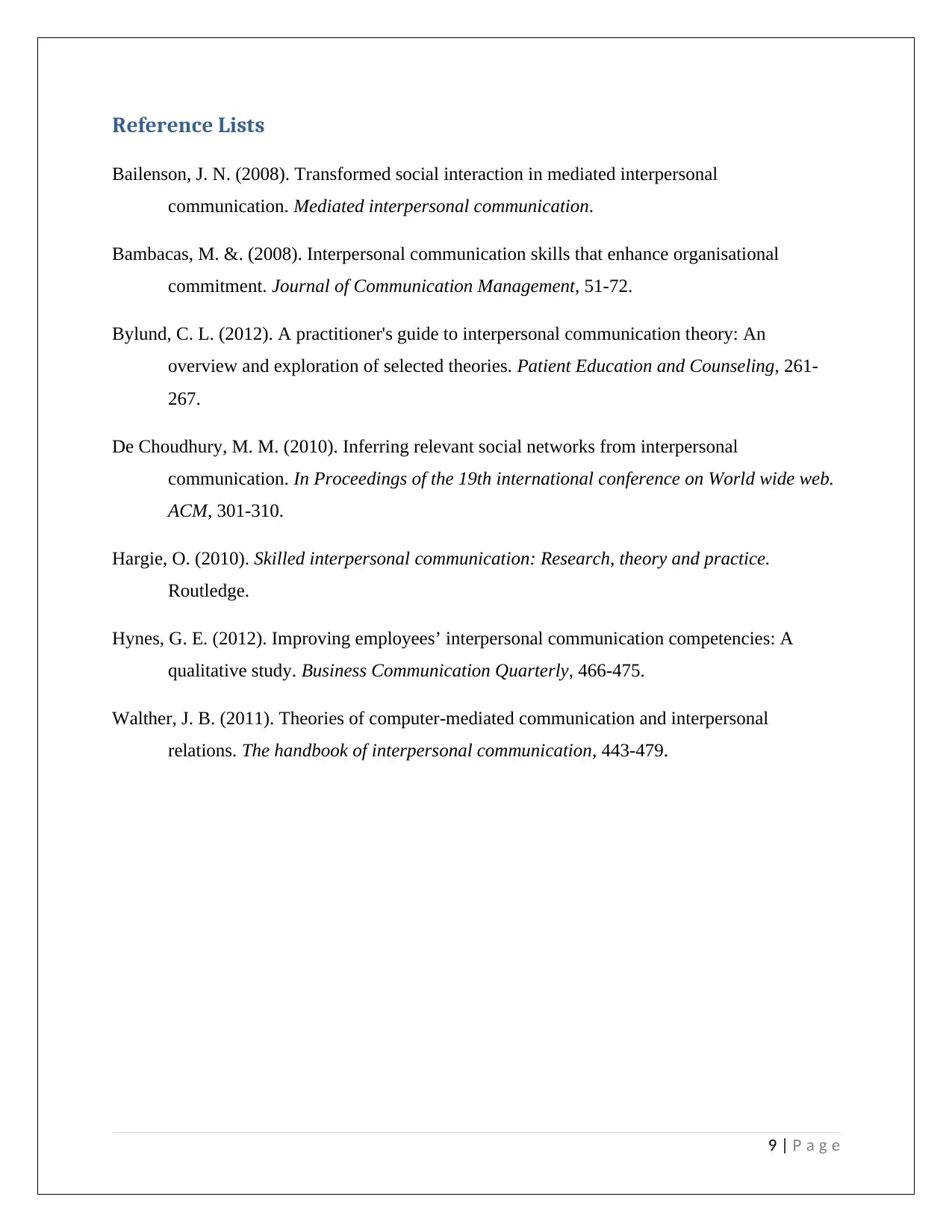
Reference Lists
Bailenson, J. N. (2008). Transformed social interaction in mediated interpersonal
communication. Mediated interpersonal communication.
Bambacas, M. &. (2008). Interpersonal communication skills that enhance organisational
commitment. Journal of Communication Management, 51-72.
Bylund, C. L. (2012). A practitioner's guide to interpersonal communication theory: An
overview and exploration of selected theories. Patient Education and Counseling, 261-
267.
De Choudhury, M. M. (2010). Inferring relevant social networks from interpersonal
communication. In Proceedings of the 19th international conference on World wide web.
ACM, 301-310.
Hargie, O. (2010). Skilled interpersonal communication: Research, theory and practice.
Routledge.
Hynes, G. E. (2012). Improving employees’ interpersonal communication competencies: A
qualitative study. Business Communication Quarterly, 466-475.
Walther, J. B. (2011). Theories of computer-mediated communication and interpersonal
relations. The handbook of interpersonal communication, 443-479.
9 | P a g e
Bailenson, J. N. (2008). Transformed social interaction in mediated interpersonal
communication. Mediated interpersonal communication.
Bambacas, M. &. (2008). Interpersonal communication skills that enhance organisational
commitment. Journal of Communication Management, 51-72.
Bylund, C. L. (2012). A practitioner's guide to interpersonal communication theory: An
overview and exploration of selected theories. Patient Education and Counseling, 261-
267.
De Choudhury, M. M. (2010). Inferring relevant social networks from interpersonal
communication. In Proceedings of the 19th international conference on World wide web.
ACM, 301-310.
Hargie, O. (2010). Skilled interpersonal communication: Research, theory and practice.
Routledge.
Hynes, G. E. (2012). Improving employees’ interpersonal communication competencies: A
qualitative study. Business Communication Quarterly, 466-475.
Walther, J. B. (2011). Theories of computer-mediated communication and interpersonal
relations. The handbook of interpersonal communication, 443-479.
9 | P a g e
⊘ This is a preview!⊘
Do you want full access?
Subscribe today to unlock all pages.

Trusted by 1+ million students worldwide
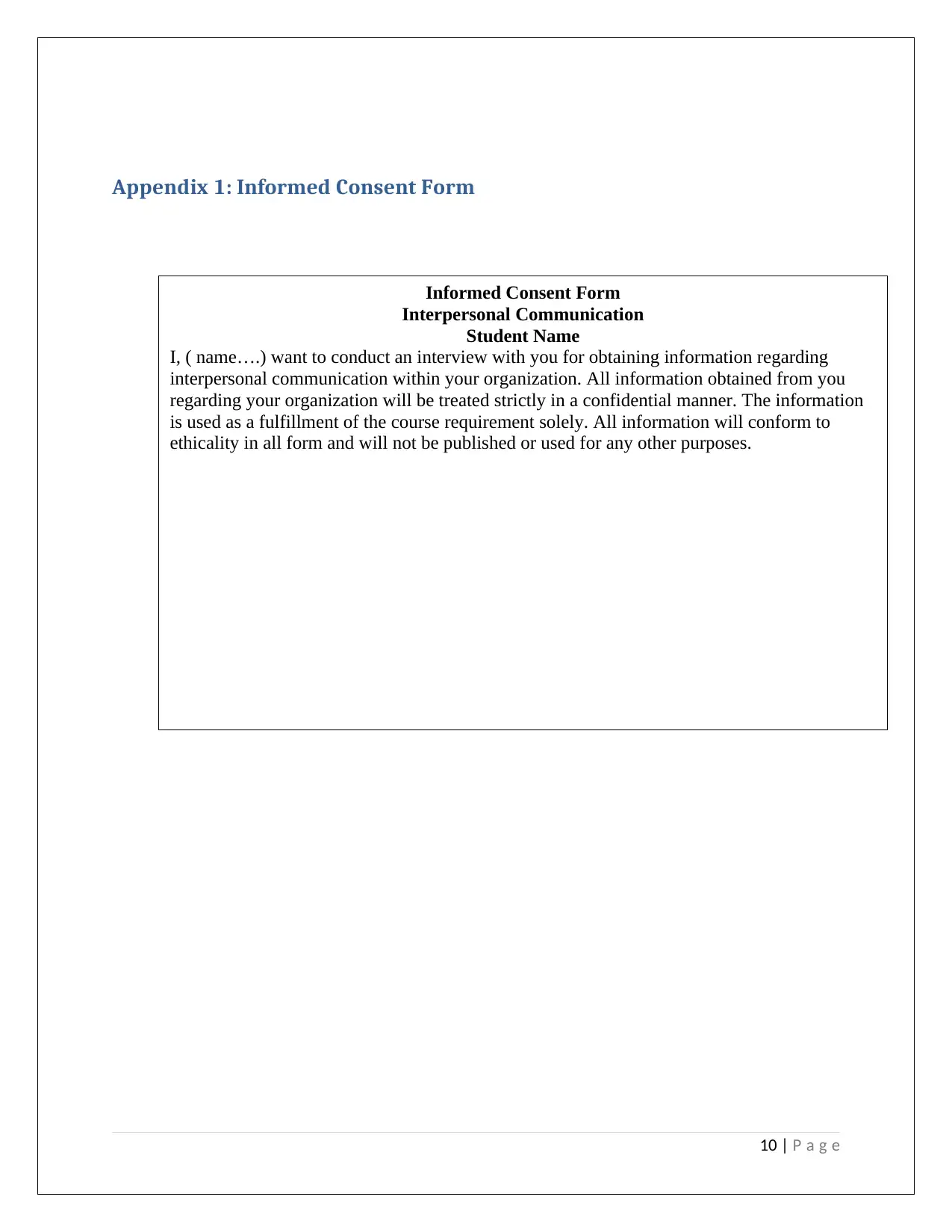
Informed Consent Form
Interpersonal Communication
Student Name
I, ( name….) want to conduct an interview with you for obtaining information regarding
interpersonal communication within your organization. All information obtained from you
regarding your organization will be treated strictly in a confidential manner. The information
is used as a fulfillment of the course requirement solely. All information will conform to
ethicality in all form and will not be published or used for any other purposes.
Appendix 1: Informed Consent Form
10 | P a g e
Interpersonal Communication
Student Name
I, ( name….) want to conduct an interview with you for obtaining information regarding
interpersonal communication within your organization. All information obtained from you
regarding your organization will be treated strictly in a confidential manner. The information
is used as a fulfillment of the course requirement solely. All information will conform to
ethicality in all form and will not be published or used for any other purposes.
Appendix 1: Informed Consent Form
10 | P a g e
Paraphrase This Document
Need a fresh take? Get an instant paraphrase of this document with our AI Paraphraser

11 | P a g e
1 out of 11
Related Documents
Your All-in-One AI-Powered Toolkit for Academic Success.
+13062052269
info@desklib.com
Available 24*7 on WhatsApp / Email
![[object Object]](/_next/static/media/star-bottom.7253800d.svg)
Unlock your academic potential
Copyright © 2020–2026 A2Z Services. All Rights Reserved. Developed and managed by ZUCOL.





